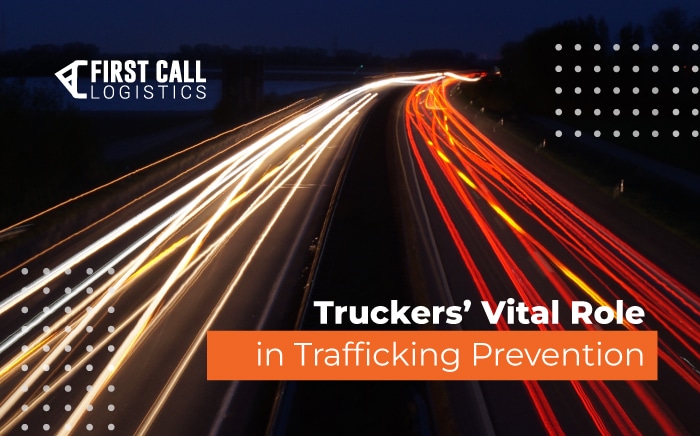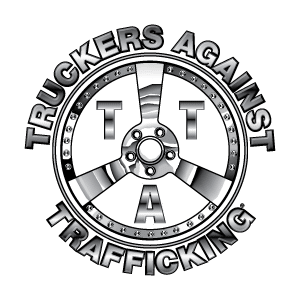Truckers’ Vital Role in Trafficking Prevention

January marks Human Trafficking Awareness Month, a cause of particular importance for truckers and other front-line workers positioned to expose trafficking activity. Find out more about how you can get involved with Truckers Against Trafficking below.
The State Department estimates the number of human trafficking victims worldwide exceeds 27 million at any given time — though some organizations estimate closer to 40 million men, women and children suffer the horrors of modern slavery in the form of forced labor and sexual exploitation.
Thanks to thousands of hours spent scanning for potential hazards while traversing some of the nation’s most remote locales, truck drivers are uniquely trained and positioned to make a difference in the ongoing global effort to stamp out trafficking activity.
Read on for more on domestic trafficking red flags, resources for prevention and how logistics professionals can expand their roles in the fight to end trafficking at home and abroad.
The Domestic Trafficking Problem
Trafficking is as much a domestic issue as it is a global one, with victims having been reported in all 50 states and estimated to number in the hundreds of thousands in the U.S. alone.
Individuals faced with compounding forms of discrimination or who interact with government-run programs (such as the criminal justice system, runaway and homeless youth services, foster or institutional care and the immigration enforcement system) are particularly vulnerable to traffickers’ deceptive recruiting practices, including fraud, manipulation and forceful coercion.
Traffickers are also known to use truck stops, highway motels and remote rest areas as cover for their crimes to remain out of sight from the general population. It’s the frequent use of these locations that puts the transportation industry in a unique position to fight back.
Truckers Against Trafficking
The trucking, transit and energy industries represent “the eyes and ears of our nation’s highways” — and individuals with an observant eye coupled with a willingness to act can make all the difference in stopping criminal activity in its tracks.
Initiatives like Truckers Against Trafficking (TAT) provide the necessary education and resources for professionals in these industries to identify and disrupt human trafficking networks. When properly trained to note warning signs of individuals who appear fearful, disoriented or not in control of their own movements — and to take swift action in conjunction with local law enforcement — the collective efforts of more than 3.5 million truckers can be a valuable asset in the ongoing fight against trafficking.
Supported by sponsors of all sizes across the transportation industry, TAT’s core programs teach hundreds of thousands of front-line workers the realities of domestic human trafficking, as well as how transport businesses and workers can be an effective weapon against those perpetrating these crimes.
Through these programs — as well as an official app loaded with free training resources and a directory for reporting suspicious activity — TAT aims to convert the millions of drivers who frequent the nation’s highways into effective agents in the fight to end trafficking for good.
Trafficking Red Flags
Signs of trafficking activities can be subtle, but to the trained eye there are several components of the trafficking business drivers should be prepared to spot. These red flags generally signal signs of control, vulnerability, recruitment, and active exploitation:
- A person’s lack of knowledge of their whereabouts; not being in control of their ID or passport.
- Restricted or controlled communication or anyone not being allowed to speak for themselves.
- CB chatter about “commercial company” or flashing lights signaling “buyer” location.
- A van or RV that seems out of place near trucks; a vehicle dropping someone off at a truck and picking them up 15 to 20 minutes later.
- Individuals that seem inappropriate together heading to the shower area.
- Signs of branding or tattooing of a trafficker’s name (often on the neck or chest).
- Signs of bruising and other visible physical trauma.
For the safety of both drivers and victims, it’s important not to approach traffickers directly. Quickly alerting law enforcement to deal with traffickers and recover victims will help avoid potential obstacles in the eventual prosecution of the traffickers.
Ending Human Trafficking: Additional Resources
Stamping out trafficking requires a team effort. Here are a few key resources for those looking to join the fight:
- TAT Truck Stop Toolkit
- Truckers Against Trafficking (TAT) App for Android | for iPhone
- DOJ Trafficking Data
- USDOT Trainings and Initiatives
- National Human Trafficking Hotline
- 2023 Trafficking in Persons Report
In an effort to actively combat human trafficking and increase the impact of truckers nationwide, First Call is a proud sponsor of Truckers Against Trafficking. Together we aim to ensure every trucker is a trained defender against trafficking and equipped with the resources they need to protect their fellow man.

The 3PL You’ve Been Looking For
Building and managing cost-efficient supply chains is a full-time job. First Call’s rare combination of in-house assets, expert problem-solving and track record of stellar customer service makes us the 3PL of choice for carrier partners looking to make the most of their miles.
“First Call always paid on time and would get me back-hauls whenever possible which was great.”
– Wayne, Carrier
More Resources for FCL Carriers:
Get the latest supply chain news and updates directly to your inbox.
